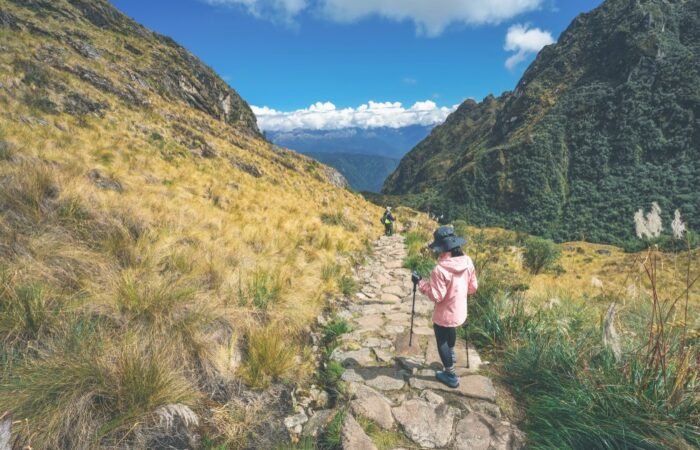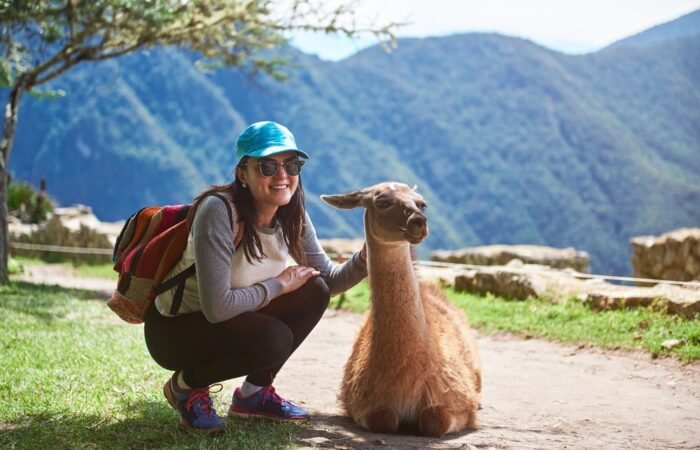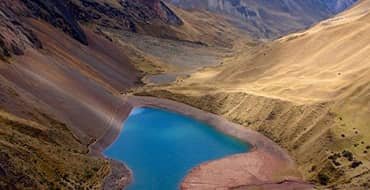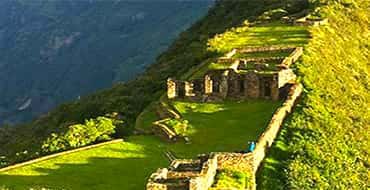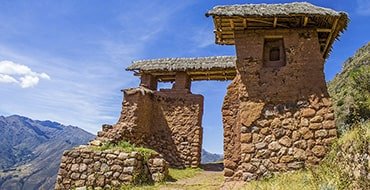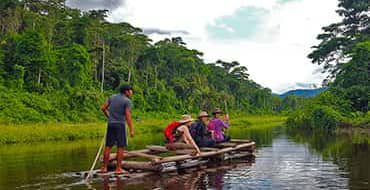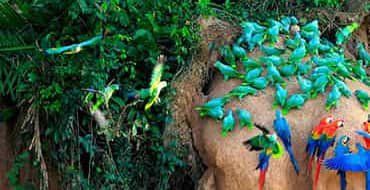

Introduction to Veganism in Peru
Veganism, a lifestyle that advocates for the exclusion of all animal products from one’s diet, has gained significant traction globally in recent years. This growing trend reflects a shift towards more ethical, sustainable, and health-conscious living. In many parts of the world, including Peru, this dietary choice intertwines with cultural influences and local culinary traditions, leading to innovative adaptations and exciting gastronomic experiences.
Peru, renowned for its rich biodiversity and vibrant culinary heritage, presents a unique context for veganism. The nation boasts a vast array of indigenous ingredients, many of which are staples in traditional Peruvian diets. Quinoa, a nutrient-dense grain, offers a protein-rich alternative for vegans, while a variety of legumes such as lentils and beans further enhance dietary protein sources. Local vegetables like purple potatoes and ají peppers contribute distinctive flavors and colors, allowing for vibrant, satisfying vegan dishes.
The rise of vegetarianism and veganism in Peru is not just a reflection of modern dietary preferences but is also influenced by a deep-rooted appreciation for local agriculture and sustainability. Peruvian cuisine, known for its fusion of flavors and cultures, aligns seamlessly with the principles of veganism, permitting the creative reinterpretation of classic dishes. For instance, traditional favorites can be made vegan using plant-based options that replicate textures and flavors traditionally derived from animal sources, such as ‘seitan’ or ‘jackfruit’ used in place of meat.
As Cusco emerges as a popular destination for vegan travelers, its restaurants and street vendors increasingly offer innovative vegan options. The intersection of Peru’s culinary richness and vegan philosophies creates a rich tapestry for exploration. Embracing this journey through Cusco, one can experience the impressive synergy of traditional Peruvian ingredients seamlessly integrated into a vegan diet, showcasing the diversity and potential of plant-based eating in this culturally significant region.


Culinary Heritage of Cusco
The culinary heritage of Cusco is a vibrant tapestry woven from ancient traditions and indigenous agricultural practices that date back to the Inca civilization. This region’s unique altitude and diverse microclimates allow for the cultivation of an array of ingredients that are foundational to its diet. Among the most significant staples are quinoa, potatoes, and corn, all of which hold both nutritional and cultural importance in the local cuisine.
Quinoa, often referred to as the “mother grain,” was a sacred food for the Incas and remains a quintessential part of the Cusco diet. This nutrient-dense grain is not only gluten-free but also rich in protein, making it an ideal choice for vegans seeking wholesome alternatives. Quinoa can be enjoyed in various ways, such as in salads or as a base for hearty vegetable dishes, allowing for a delightful exploration of local flavors.
Potatoes, known as “papa” in Quechua, showcase an incredible diversity, with thousands of varieties cultivated in the Andean regions. The potato is a potent symbol of Cusco’s agricultural heritage and serves as a versatile ingredient in numerous dishes. From simple boiled potatoes to more elaborate preparations like “causa” (a cold potato dish), vegans can appreciate the rich textures and tastes that this beloved tuber offers.
Corn, or “maíz,” is another cornerstone of Andean cuisine, revered for its historical significance and array of uses. It is enjoyed in many forms, from refreshing beverages like “chicha morada” to the traditional “tamales.” For vegans, corn provides a flavorful ingredient that can enhance both sweet and savory dishes, allowing for endless culinary creativity. Understanding these staple foods deeply enriches the experience of Cusco’s local cuisine, offering vegans the opportunity to indulge in authentic flavors while respecting cultural traditions.


Vegan-friendly Dining Spots in Cusco
Cusco, a city rich in history and culture, offers an intriguing culinary landscape for vegan travelers. Numerous restaurants and cafes in the area cater to plant-based diets, providing an authentic taste of local flavors while ensuring that vegans have delightful options to explore. Below are some notable vegan-friendly dining spots in Cusco.
One of the top recommendations is Green Point, a popular spot known for its vibrant atmosphere and extensive vegan menu. Located near the main square, this restaurant features dishes such as quinoa burgers and traditional Peruvian causa made with avocado and vegetables. Its commitment to using organic ingredients makes it a standout destination for health-conscious diners.
For those seeking a cozy cafe experience, La Cafetería del Museo offers a quiet nook adorned with local art. The menu includes mouthwatering vegan options like lentil soup and fresh salads adorned with seasonal vegetables. Their vegan pastries are also worth trying, providing a perfect accompaniment to a cup of organic coffee.
Another notable option is Chicha por Gastón Acurio, where renowned chef Gastón Acurio presents a unique twist on traditional Peruvian dishes. Their vegan selections include a flavorful quinoa risotto and various veggie-based tapas. The restaurant encapsulates a blend of modern dining aesthetics while paying homage to local culture.
Finally, for a true street food experience, El Perol, located at the artisan market, provides vegan empanadas and tamales made from corn. The vibrant setting, combined with friendly vendors, makes it an excellent choice for those who wish to indulge in local street flavors while adhering to their vegan lifestyle.
These establishments not only offer delectable vegan dishes but also invite diners to experience the rich cultural tapestry of Cusco through its culinary offerings. Each restaurant emphasizes fresh, local ingredients, ensuring that diners can enjoy satisfying and wholesome meals throughout their stay.


Cooking Vegan: Traditional Peruvian Ingredients to Use
Peru boasts a rich tapestry of traditional ingredients that are not only a staple in its culinary landscape, but are also perfect for vegan cooking. Choosing the right components can enhance the flavors of your dishes while staying true to a plant-based diet. Among the most popular ingredients are ají peppers, which vary in heat and can add a distinctive kick to your meals. Different varieties, such as ají amarillo, ají panca, and ají limo, offer unique flavor profiles and color that can elevate any vegan recipe.
Another significant ingredient in Peruvian cuisine is the ubiquitous potato. Peru is home to over 4,000 varieties of potatoes, each contributing different textures and tastes to dishes. When preparing vegan meals, consider using Peruvian purple potatoes, which not only add a rich color but also incorporate antioxidants. These potatoes can be roasted, mashed, or used in salads to create visually appealing and nutritious dishes. Similarly, the golden and red-skinned varieties lend themselves well to various cooking methods, making them versatile staples in any kitchen.
Moreover, fresh vegetables available in local markets are essential in vegan Peruvian cooking. Ingredients such as corn, chia seeds, and quinoa are richly integrated into traditional dishes. Corn is often used in stews or salads, while quinoa serves as a hearty base for many meals, being both protein-rich and gluten-free. Chia seeds can be sprinkled on top of dishes or used to create delicious puddings, contributing a nutritious element to your culinary repertoire. Experimenting with these ingredients will not only expand your cooking possibilities but also deepen your appreciation for the vibrant flavors of Peruvian cuisine.


Cultural Festivals and Events Celebrating Veganism
Cusco, known for its rich history and vibrant culture, is a city that has embraced a diverse culinary landscape. Over the years, various cultural festivals and events have emerged that celebrate not only traditional cuisine but also promote biodiversity and food sustainability. These gatherings play a significant role in introducing and highlighting vegan options, thereby fostering a more inclusive food culture.
One notable event is the “Feria del Mercado de San Pedro”, which is held annually to showcase local produce and traditional dishes. This festival provides an excellent platform for vendors to present their organic and plant-based offerings. From vibrant vegetable displays to innovative vegan entrees crafted from indigenous ingredients, the festival underscores the importance of sustainability and encourages the community to embrace plant-based diets.
Moreover, the “Inti Raymi”, or Festival of the Sun, incorporates elements that celebrate nature and local agricultural practices. While the festival traditionally features regional dishes, there is an emerging trend among local eateries to offer vegan alternatives that reflect the values of sustainability. These options emphasize local herbs and grains, showcasing how cultural practices around food are evolving to include plant-based choices.
Additionally, workshops and seminars are becoming increasingly popular during these festivals. Experts discuss topics related to sustainable agriculture, nutrition, and the benefits of plant-based diets. These educational forums engage the community, raising awareness about the importance of biodiversity and the role of veganism in promoting environmental sustainability.
Overall, these cultural festivities in Cusco not only highlight the region’s agricultural bounty but also signify a growing acceptance and celebration of veganism, allowing both locals and visitors to experience the culinary possibilities of a plant-based lifestyle. This shift towards sustainability demonstrates a commitment to nurturing the environment while enhancing community participation in food culture.


Engaging with Local Vegan Communities
Connecting with local vegan communities in Cusco can greatly enrich your experience as a plant-based traveler. The vibrant and diverse vegan scene in this culturally rich city is supported by various groups and organizations dedicated to promoting veganism and plant-based living. Engaging with these communities not only facilitates shared experiences but also enables you to discover new recipes, local initiatives, and advocacy opportunities, all while fostering connections with like-minded individuals.
One popular avenue for engagement is through social media platforms, where several groups focus on vegan lifestyles. For example, Facebook and Instagram host numerous pages and accounts that cater specifically to vegans in Cusco. These platforms often share valuable insights about vegan-friendly restaurants, upcoming events, and seasonal produce. By following these accounts, you can stay updated on the latest developments in the local vegan scene, enabling you to make informed choices during your stay.
Additionally, you may find interest-based meetups where local vegans gather to share meals, recipes, and tips for maintaining a plant-based diet in the region. These events often provide a friendly atmosphere designed to encourage conversations and foster friendships among attendees, thereby creating a support network for those committed to veganism. Websites like Meetup.com or even local bulletin boards in cafes may list such gatherings, making it easy to find a welcoming environment.
Engaging with local vegan communities can also present opportunities to participate in outreach programs or advocacy initiatives. Many organizations focus on raising awareness about the benefits of veganism, both for health and environmental impact. By joining these projects, you not only contribute to a greater cause but also build connections and friendships with fellow vegans who share your values. Together, these interactions cultivate a supportive landscape for anyone embracing a plant-based lifestyle in Cusco.


Sustainable Vegan Practices in Peru
The burgeoning movement of veganism in Peru aligns harmoniously with increasingly heightened awareness surrounding sustainability and ecological conservation. Given Peru’s rich biodiversity, recognizing and implementing sustainable practices is of paramount importance for ensuring the survival of its unique ecosystems. A vegan diet inherently promotes a lower carbon footprint, as it relies less on resource-intensive farming methods associated with animal agriculture. This shift not only aids in reducing greenhouse gas emissions but also conserves vital water resources and land needed for biodiversity.
In the context of Peru, many local farming initiatives are emerging that emphasize sustainable agriculture. These initiatives prioritize organic farming techniques, which avoid harmful pesticides and synthetic fertilizers, thus maintaining the integrity of the soil and surrounding ecosystems. Such practices not only support the local economy but also enhance food security within communities. By supporting local producers who engage in environmentally-friendly farming, vegan consumers can significantly mitigate the negative impacts associated with conventional agricultural methods.
Furthermore, various Peruvian organizations are dedicated to promoting sustainable veganism through education and outreach programs. These organizations advocate for the importance of plant-based diets and the environmental benefits of consuming locally sourced produce. By choosing vegan options, individuals contribute to a culinary culture that respects natural resources while also preserving culinary traditions. Additionally, this conscious consumption encourages restaurants and markets to offer more sustainable food choices, recognizing the growing demand for eco-friendly vegan options.
Ultimately, engaging in sustainable vegan practices in Peru not only benefits personal health but also fosters environmental stewardship. By embracing these principles, vegans can create a meaningful impact, encouraging wider adoption of sustainable practices—thereby promoting a greener future for both the planet and its diverse inhabitants.


Day Trips: Vegan-friendly Adventures Around Cusco
Exploring the rich landscapes and historical wonders surrounding Cusco can be an exhilarating experience for vegans seeking adventure. Several day trips cater not only to the spirit of adventure but also offer vegan-friendly dining options to enhance your journey. One highly recommended destination is the Sacred Valley, where you can immerse yourself in the stunning scenery and visit the picturesque town of Ollantaytambo. Many local eateries in the valley provide plant-based meals such as quinoa salads and vegetable stews, making it easy to enjoy a satisfying lunch after a morning hike.
For hiking enthusiasts, the trek to Rainbow Mountain should not be missed. This vibrant, multicolored mountain offers breathtaking views and a unique hiking experience. As it is a long trek, it is advisable to pack your own vegan snacks such as energy bars, dried fruit, and nuts. This ensures you have plenty of nourishment on hand to keep your energy levels up during the ascent. After the trek, you can find local guides who may offer vegan options at their base camps or suggest nearby towns that cater to dietary needs.
Another noteworthy excursion is the visit to Moray, featuring impressive agricultural terraces that showcase ancient Inca ingenuity. The nearby Maras salt mines present the opportunity to learn about traditional salt extraction methods, enriched with stunning views of the surrounding mountains. While at Moray, several local dining establishments serve traditional Andean dishes with a vegan twist, allowing you to savor authentic flavors without compromising your dietary preferences.
Ultimately, the natural beauty and cultural richness around Cusco provide ample opportunity for vegan-friendly adventures. Whether trekking through the Sacred Valley or exploring ancient archaeological sites, you can enjoy every aspect of your day trips while adhering to your plant-based lifestyle. Remember to always carry a few snacks for sustenance and to encourage local establishments that support vegan dining options during your travels.


Conclusion: Embracing Veganism in the Heart of Peru
In navigating the culinary landscape of Cusco, it becomes evident that embracing veganism here is not only feasible but can also be an enriching endeavor. The city, known for its rich cultural heritage and diverse gastronomy, offers a plethora of options for those who adhere to a plant-based diet. By delving into local customs and regional ingredients, vegans can partake in a unique exploration of flavors while remaining true to their dietary preferences.
Cusco’s vibrant market scene showcases an abundance of fresh fruits, vegetables, grains, and legumes, which lay a foundation for creative vegan meal preparations. The adaptation of traditional dishes to meet vegan standards is a testament to the culinary evolution occurring within the city. Restaurants are increasingly recognizing the demand for vegan options, and many pride themselves on delivering dishes that celebrate local ingredients while aligning with plant-based values.
Moreover, understanding local culture allows vegans to connect more deeply with their surroundings. Engaging with local communities, participating in cultural festivities, and discovering traditional cooking methods can enhance the overall experience of living or traveling in this historic region. This connection not only fosters a sense of belonging but also encourages the acceptance of veganism among Peruvians, paving the way for a more inclusive culinary scene.
Ultimately, being vegan in Cusco offers the opportunity to enjoy the best of both worlds: indulging in delicious, healthy plant-based cuisine while immersing oneself in the rich tapestry of Peruvian culture. The journey invites exploration and discovery, challenging preconceived notions while celebrating diversity in diets. By choosing to embrace this lifestyle choice, individuals contribute to a growing trend that advocates for sustainability, health, and respect for cultural nuances.
